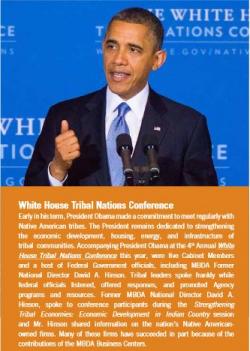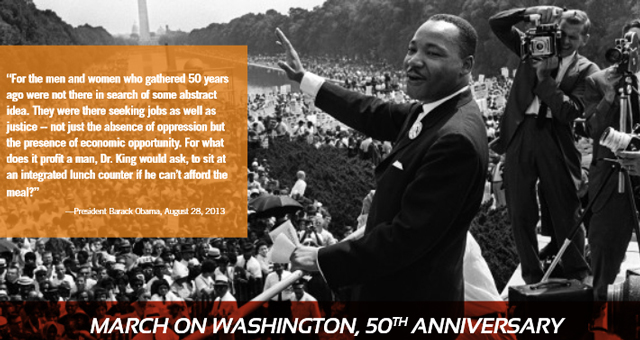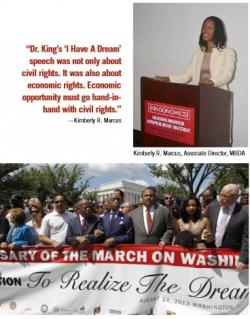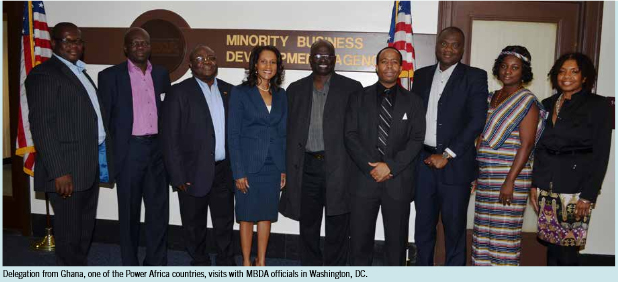 Message from U.S. Secretary of Commerce Penny Pritzker
Message from U.S. Secretary of Commerce Penny Pritzker
Message from MBDA National Director Alejandra Y. Castillo
U.S. Department of Commerce OPEN FOR BUSINESS Agenda
Expanding Services for MBDA Clients
Business Center Profile: Phoenix, Arizona
Stimulating Growth through Strategic Alliances
Government Partnerships Foster Economic Vitality for MBEs
Transforming America’s Cities
Growing Business through Exports
Honoring Minority Business Leaders
Fiscal Year 2013 Performance
MBDA Business Services
MBDA Senior Management
Nationwide Network of MBDA Business Centers
MBDA Performance Metrics
Message from U.S. Secretary of Commerce
Secretary Penny Pritzker
 This has been another record year for the Department of Commerce. In 2013, after extensive engagement with businesses and thought leaders, we unveiled the U.S. Department of Commerce’s Open for Business Agenda. This agenda reflects our focus on entrepreneurs and our commitment to create the conditions necessary for U.S. companies to grow. Trade and investment, innovation, and unleashing data are among our top priorities. Greater access to markets and customers, cutting-edge manufacturing and technology, a well-trained workforce, and information to make smart decisions and stay ahead are all essential for businesses to thrive.
This has been another record year for the Department of Commerce. In 2013, after extensive engagement with businesses and thought leaders, we unveiled the U.S. Department of Commerce’s Open for Business Agenda. This agenda reflects our focus on entrepreneurs and our commitment to create the conditions necessary for U.S. companies to grow. Trade and investment, innovation, and unleashing data are among our top priorities. Greater access to markets and customers, cutting-edge manufacturing and technology, a well-trained workforce, and information to make smart decisions and stay ahead are all essential for businesses to thrive.
Minority-owned firms are a priority for the U.S. Department of Commerce. The Minority Business Development Agency (MBDA) is engaged with the most innovative companies nationwide. These firms participate in every sector of the U.S. economy, contribute more than $1 trillion in annual economic output, and employ millions of American citizens. The MBDA approach to assisting minority-owned businesses to grow in size and scale, as well as to compete globally, is inextricably linked to the Obama Administration’s focus on creating jobs and providing opportunities for all Americans.
MBDA’s Annual Performance Report for 2013 demonstrates the agency’s continued commitment to “Growth, Diversification and Transformation.” In fiscal year 2013, through MDBA’s nationwide network of Business Centers, we have assisted clients in securing more than $4.8 billion in contracts and capital. This led to the creation and retention of more than 25,000 U.S. jobs.1Achievements like these confirm and contribute to a new chapter of economic productivity.
The U.S. Department of Commerce continues to successfully advance President Obama’s National Export Initiative by aiding U.S. businesses in becoming more globally adept. Minority-owned firms export to nearly every country, and there is ample room for further development using the same skills, attributes, and relationships that make them even more effective U.S. exporters.
We applaud MBDA’s engagement in the Doing Business in Africa and the Look South campaigns, as well as other key initiatives. Through collaborations like these in both the public and private sectors, we can continue to share knowledge and better leverage resources for the benefit of all American businesses.
To secure a successful future, MBDA continues to empower minority-owned firms–the fastest growing business sector in America. We thank you for your continuous support for the important work of MBDA to create increased prosperity across the nation.
Sincerely,
Penny Pritzker
Secretary, U.S. Department of Commerce
Message from MBDA National Director
Alejandra Y. Castillo
 It is with great pleasure that I present to you Fiscal Year (FY) 2013 Annual Performance Report of the Minority Business Development Agency (MBDA). FY 2013 was yet another great year of growth and continued record performance for MBDA. Through its integrated nationwide network of MBDA Business Centers, the Agency has continued its efforts to streamline its operations while building synergy and efficiencies in helping American firms access $4.8 billion in contracts and capital awards. In FY 2013, our Agency’s performance has led to the creation and retention of over 25,000 American jobs. These results build on the amazing accomplishments of FY 2009-12 and represent the highest performance in MBDA’s 44 year history. Over the course of the Obama Administration, MBDA has helped minority-owned firms access $19.4 billion in contracts and capital which also created or retained nearly 60,000 jobs.1
It is with great pleasure that I present to you Fiscal Year (FY) 2013 Annual Performance Report of the Minority Business Development Agency (MBDA). FY 2013 was yet another great year of growth and continued record performance for MBDA. Through its integrated nationwide network of MBDA Business Centers, the Agency has continued its efforts to streamline its operations while building synergy and efficiencies in helping American firms access $4.8 billion in contracts and capital awards. In FY 2013, our Agency’s performance has led to the creation and retention of over 25,000 American jobs. These results build on the amazing accomplishments of FY 2009-12 and represent the highest performance in MBDA’s 44 year history. Over the course of the Obama Administration, MBDA has helped minority-owned firms access $19.4 billion in contracts and capital which also created or retained nearly 60,000 jobs.1
However, the performance numbers are just a piece of the overall impact. Responding to the President’s call to make FY 2013 “a year of action,” MBDA ensured that we reached many more minority-owned firms throughout the nation. In addition to reaching new heights, the Agency was active in expanding its reach and services for the rapidly growing segment of the economy we serve. We opened seven new MBDA Business Centers in Baltimore, MD, Bridgeport, CT, Houston, TX, Bronx, NY, St. Louis, MO, San Francisco, CA, and Washington, DC.
Throughout FY 2013, MBDA entered into a formal agreement with the California High Speed Rail Authority to achieve greater participation of minority-owned firms in the state’s largest infrastructure project. The system will run from San Francisco to San Diego, totaling 800 miles with up to 24 stations. The California High Speed Rail Authority is working with regional partners to implement a statewide rail modernization plan that will invest billions of dollars into local and regional rail lines to meet the state’s 21st century transportation needs.
Similarly, MBDA is collaborating closely with the U.S. Department of Energy to help develop access and capacity for minority-owned firms to engage in the growing energy industry. Through these efforts, we hope to help leverage “lab to market” opportunities and ensure greater participation in the growing energy sector by assisting in capacity building and market entry.
We also better positioned our business centers to assist firms with expanding their client base nationally, and to consider expanding their business operations through exports overseas. In an effort to amplify the National Export Initiative, MBDA continued to partner with a number of federal agencies, such as the International Trade Administration and Trade Promotion Coordinating Committee, as well as outside groups, such as the National Association of Small Business International Trade Educators, to provide enhanced training on opportunities abroad while creating more jobs at home.
Our FY 2013 accomplishments have further anchored our Agency as a critical resource for the over 5.8 million U.S. minority-owned firms.2 While we are proud of the results achieved, we are not content. As the only federal agency focused on the growth in size and scale of minority-owned firms, we are looking to build upon the results of FY 2013 and make FY 2014 not only a year of action, but a year of increased opportunity for all. MBDA will join with its fellow bureaus within the Department of Commerce to advance Secretary Penny Pritzker’s bold policy agenda focused on trade, investment, innovation, and data. America and the Department, are indeed, “Open for Business.” Together, as One Commerce, we will build upon the progress the nation’s economy has made during the Obama Administration.
In 2014, MBDA will continue to support this segment to ensure their efforts are not in vain and our economy continues to grow. We will continue to realize President Obama’s vision of an America where work is plentiful and communities are strong. Each of you will play a role in this effort and I look forward to working with you.
Alejandra Y. Castillo
National Director
Minority Business Development Agency
U.S. Department of Commerce
OPEN FOR BUSINESS AGENDA
“This agenda is a critical part of the President’s overall effort to grow the economy and create jobs. We have an opportunity right now to work together to set the conditions for a vibrant, 21st century economy and the good jobs that come with it. My commitment is that my Department will be responsive, customer-focused, and outcomes driven… and we will demand a strong return on investment just like American businesses do.”
— U.S. Secretary of Commerce Penny Pritzker
The day Penny Pritzker came onboard as the 38th U.S. Secretary of Commerce she hung a sign on her door that read “Open for Business,” signaling that the Department is focused on our most important customer—business leaders—and the conditions necessary for U.S. companies to grow and create jobs. Shortly afterward, Secretary Pritzker embarked upon a nationwide “listening tour,” during which she visited 13 cities in 12 states and met with hundreds of business leaders, CEOs, entrepreneurs, thought leaders, and Commerce employees. The feedback she received helped determine the areas of focus for the Department of Commerce which are outlined in her Open for Business Agenda.
The Open for Business Agenda complements the broader Obama Administration’s blueprint for rebuilding the economy, and is comprised of five pillars: Trade and Investment; Innovation; Environment; Data; and Operational Excellence. Most of MBDA’s work falls under Trade and Investment. The nationwide network of business centers is dedicated to creating and retaining jobs by helping minority-owned firms secure contracts, financing, and new markets in which to sell their goods and services. In FY 2013, MBDA helped these firms secure $4.8 billion in contracts and capital and to create/retain over 25,000 jobs.1
 MBDA contributes significantly to Innovation. As put forth in the Open for Business Agenda, “manufacturing is a key indicator of a country’s innovative capacity.” Over the past five years, MBDA has increasingly elevated the Agency’s focus on clients in the manufacturing sector. As a result, for the second consecutive year, manufacturing was the top industry for MBDA client contracts, which totaled $1.3 billion.1
MBDA contributes significantly to Innovation. As put forth in the Open for Business Agenda, “manufacturing is a key indicator of a country’s innovative capacity.” Over the past five years, MBDA has increasingly elevated the Agency’s focus on clients in the manufacturing sector. As a result, for the second consecutive year, manufacturing was the top industry for MBDA client contracts, which totaled $1.3 billion.1
As you will see in the next chapter through our significant investments in the MBDA Business Center network—new business centers, supplemental funding, working group collaboration, and global business certification—our commitment to Operational Excellence continues to be a priority for the Agency.
Expanding Services for MBDA Clients

For more than four decades, the Minority Business Development Agency (MBDA) has led Federal Government efforts to provide focused support to minority business enterprises (MBEs), which are increasingly critical contributors to the U.S. economy. With over 5.8 million minority-owned firms throughout the nation, MBDA remains committed to the growth and sustainability of MBEs.2 The Agency’s national programs and initiatives provide increased access to contracts, capital, and markets. To that end, FY 2013 marked the first full year of operation under a new business center model designed to invest more funding in programs and services that directly impact minority-owned firms. The new business center model eliminated geographic boundaries for service delivery and now allows MBDA clients, regardless of their location, to seek services from any MBDA Business Center. The new model also introduced “specialty centers” that deliver expert industry and market consulting services and opportunities.
 MBDA Welcomes Seven New Business Centers
MBDA Welcomes Seven New Business Centers
In FY 2013, MBDA opened seven new MBDA Business Centers in the following cities: Baltimore, Maryland; Bridgeport, Connecticut; Bronx, New York; Houston, Texas; San Francisco, California; St. Louis, Missouri; and Washington, DC. These seven new Centers make us locally accessible to an additional 1.3 million minority-owned firms.3 The MBDA network can be found in 44 locations, as well as several expanded service areas and annexes to serve clients in locations that do not yet have an MBDA Business Center.
Supplemental Funding for Specialty Centers
Five MBDA Business Centers were awarded supplemental funding in FY 2013. These Centers have excelled in developing a specialization in specific industries or market access and export promotion strategies. Under the improved business center model, a client in New York, for example, can seek services from the San Antonio MBDA Business Center to increase exports to South America, or from our Atlanta Center to gain entrance into the advanced manufacturing or healthcare information technology markets. Furthermore, in an effort to underscore the President’s priority to create U.S. jobs in advanced manufacturing and exports, the supplemental funding of $625,000 has served to encourage and develop unique expertise among MBDA Business Centers, while forging greater collaboration and synergy throughout the business center network.
Clients Benefit from New Working Groups’ Collaboration
MBDA Business Centers are funded by Federal Government cooperative agreements with organizations that work on behalf of U.S. minority-owned businesses. In FY 2013, MBDA’s nationwide network of business centers grew to 44 Centers operated by 38 distinct organizations, many of which include businesses, universities, and nonprofit organizations. The collective wealth of knowledge and resources of these operators continues to be invaluable to the minority business community. To facilitate cross-communication and collaboration across the nationwide network of MBDA Business Centers, four “working groups” were established in the areas of: 1) alternative financing, 2) exports, 3) advanced manufacturing, and 4) hospitality. Working group members meet regularly to share best practices and insights, as well as provide information about upcoming public and private projects and related procurement opportunities. For example, in FY 2013, the export working group’s collaborative efforts contributed to the Agency’s export transactions totaling $40 million.1
 Global Business Certification Enhances International Business Expertise
Global Business Certification Enhances International Business Expertise
In line with the President’s National Export Initiative, MBDA continued to assist MBEs with identifying and capitalizing on increased export opportunities. However, the logistics of marketing, selling, and transporting goods abroad can be complex and at times cumbersome. MBDA worked with the University of Texas at San Antonio’s Institute for Economic Development to deliver a customized curriculum on international business management during our 2013 National Training Conference for MBDA and business center staff. Topics included: global marketing, supply chain management, trade finance, and legal/regulatory compliance. Attendees are now prepared to pursue NASBITE certification as global business professionals, expanding the knowledge base available through the MBDA Business Center network.4
MBE Public Engagement Soars
The opportunity to access business information, tools, and resources are integral to the growth, competitiveness, and sustainability of MBEs. During FY 2013, our communication strategy merged traditional and digital communication by using print publications, e-newsletters, and social media to increase our outreach and service delivery. The e-newsletter reached over 55,000 subscribers monthly and was expanded to include a specialty newsletter focused on global opportunities, which added thousands of new subscribers.5 Our efforts resulted in a 29 percent increase in website visitors and a 186 percent increase in international visitors from over 200 countries.5
Our social media reach also increased by 40 percent compared to the prior fiscal year. Nearly 14,000 followers connected with MBDA across our social media channels—Facebook, Twitter, and LinkedIn.5 Throughout the year, MBDA also partnered with various federal agencies and bureaus to further boost our digital engagement. Of notable mention was our collaboration with eight federal export and trade promotion agencies to offer a three-part question and answer #TradeChat series during World Trade Month, an effort that reached over 400,000 Twitter accounts.5 Similarly, MBDA offered entrepreneurs a clearinghouse of expert guidance with “how to” articles about financing, taxes, sales and marketing; webinars on federal contracting, exports, and mergers and acquisitions; and business tools, including a virtual matchmaking system and a conference calendar.
Stimulating Growth through Strategic Alliances
Strategic Alliances and Business Partnerships Stimulate Growth
In FY 2013, MBDA created a new outreach unit to strengthen relationships with existing partners and to engage in new alliances with public and private sector stakeholders. By establishing more touch points with chambers of commerce, associations, councils, and other business entities, MBDA has further solidified its role as the expert and champion of minority business enterprises with federal, state, and local governments, as well as with the private sector business community.
 Agreement Increases Access to California High-Speed Rail Contracting Opportunities
Agreement Increases Access to California High-Speed Rail Contracting Opportunities
Repairing bridges and highways, building new transit structures, and creating smarter transportation systems support millions of jobs nationwide. The California high-speed rail will connect the mega-regions of the state, contribute to economic development, create jobs, promote a cleaner environment, and preserve agricultural and protected lands. By 2029, the system will run from San Francisco to the Los Angeles basin in less than three hours at speeds of over 200 miles per hour; and eventually will extend to Sacramento and San Diego.
In May 2013, MBDA entered into a formal agreement with the California High-Speed Rail Authority (Authority) to ensure that minority-owned businesses receive timely contracting information and technical assistance related to this significant contracting opportunity.
Under the Authority’s guideline, high-speed rail related contracts must meet a minimum participation goal of 30 percent for certified MBEs, small and disadvantaged businesses, and disabled veteran business enterprises. Under the agreement, MBDA will continue to provide minority-owned firms with professional management and technical assistance, as well as information regarding certification processes. In turn, the Authority helps these firms access high-speed rail contract procurement intelligence to better identify existing and upcoming opportunities.
MBDA Works to Ensure Clients Get Share of $2.1 Billion Project in Central Connecticut
MBDA was among several organizations ready to help small, women-owned, and minority-owned firms gain access to contracts surrounding a $2.1 billion water cleanup effort by Central Connecticut’s Metropolitan District Commission (MDC). The MDC construction project has been heralded as one of America’s leading “dig ready“ model projects, of which $408 million was used to create jobs to rebuild outdated infrastructure during Phase I. MBDA’s technical assistance and outreach efforts helped identify procurement-ready MBE firms to successfully bid on these for opportunities.
Alternative Funding: Family Offices, Angel Investors, and Crowd Funding
Through a concerted effort of technical assistance, MBDA helped secure over $1.5 billion in capital and financing for clients in FY 2013.1 In addition to traditional sources of capital, we launched an initiative to introduce our clients to alternative capital sources. Our work to provide alternative financing options to MBEs is twofold: educating clients and firms about the types of alternative financing available; and advocating on their behalf with venture capitalists, angel investors, family offices, and crowd funding operators. In fact, one of our first pitches to venture capital firm, Brevet Capital Management, resulted in $20 million in capital for the expansion of a San Jose MBDA Business Center client’s home health services company.8
Last March, MBDA hosted its inaugural Family Office Investor Forum in New York in partnership with T5 Equity Partners. The minority businesses selected to participate were vetted and coached three months in advance to present their value propositions to eight family office investors. Funding requests ranged from $1 million to $100 million.9 The industries represented by the MBE firms included:
- Solar and hybrid street lighting solutions
- Eco-friendly sustainable and disposable products
- Social media platform for recruitment of National Collegiate Athletic Association coaches and high school athletes
- Online business matchmaking solutions
- Multi-use and mixed-use real estate in urban communities
Participating firms are engaged in negotiations and have been taken on by investors for additional coaching and mentoring. As a result of this effort, each of these firms is better positioned to seek venture capital, angel investors, and crowd funding in the future.
 MBDA Continues to Promote Supplier Diversity in Healthcare
MBDA Continues to Promote Supplier Diversity in Healthcare
Among the fastest growing industries, healthcare is one of the top for minority-owned firms. According to the latest Survey of Business Owners data, MBEs in the Healthcare & Social Services industry sector represent 13 percent of all sectors. Employment in the healthcare industry is projected to increase 27 percent through 2014, compared with 14 percent for all industries combined.10 Such industry growth projections inspired our partnership with the Healthcare Supplier Diversity Alliance (HSDA) to increase access to healthcare contracting opportunities for MBEs. The partnership was also designed to build awareness of the healthcare industry through education, and to create pathways for minority firms to enter healthcare supply chains.
Our efforts to support minority-owned healthcare firms are led by the Atlanta MBDA Business Center, one of the Agency’s specialty business centers. Last year, Project Director Donna Ennis delivered the keynote address at the HSDA Annual Symposium and hosted a panel on healthcare manufacturing. Several MBDA clients are pursuing opportunities as a result of this meeting.
Also during FY 2013, the Atlanta MBDA Business Center launched a healthcare program—Healthcare Technology Action Collaborative—a teaming endeavor with groups of four MBE member companies that are pursuing healthcare opportunities together as a team. The Center collaborates with the Georgia Institute of Technology to host monthly Health IT Circle meetings to provide information and education about the healthcare industry and related technology to interested minority-owned firms.
Government Partnerships Foster Economic Vitality for MBEs
Government Partnerships Foster Economic Vitality
The value of partnership is immeasurable. Since MBDA’s founding, collaboration has been the cornerstone of our success and record performance in serving the minority business community. Our partners have varied—from private to public, from short-term to institutional, and from domestic to global—but the nature of our affiliations has always been centered on a shared vision in support of economic vitality, job creation, and strengthening minority business enterprises.
Creating Growth Opportunities in Energy for Minority Businesses
Innovation and a growing demand for energy have created new business opportunities domestically and abroad. In January 2013, MBDA and the U.S. Department of Energy (DOE), Office of Economic Impact and Diversity agreed to a memorandum of understanding (MOU) aimed at increasing the participation of MBEs in energy—the third largest industry in the United States. By jointly providing technical assistance and pertinent information to MBEs, these companies will be better equipped with the education, tools, and resources to better compete in significant contracting and subcontracting programs.
MBDA and DOE have also worked to unveil growth opportunities for minority businesses through technology transfer. By connecting MBDA’s Business Centers to the technical resources and intellectual property of DOE’s 17 national laboratories, and 10 program offices, we expect to see commercialization of research and development, heightened innovation, strategic partnerships, and the channeling of new contracting opportunities for minority businesses.
MBDA Clients Appointed to Manufacturing Council
MBDA clients were among 30 members appointed to the Commerce Secretary’s Manufacturing Council (Council) in FY 2013. The Council advises the Secretary of Commerce on government policies and programs that affect U.S. manufacturing and provides a forum for proposing solutions to industry-related problems. The Council also works to ensure that the United States remains the preeminent destination for investment in manufacturing throughout the world.
Among new members appointed to the 2013 Manufacturing Council were MBDA Business Center clients, Christie Wong Barrett of Mac Arthur Corporation and Andra Rush of Detroit Manufacturing Systems. Headquartered in Michigan, both companies are industry leaders with expertise that spans decades and operations that reach national and international markets. Their depth of experience will greatly contribute to the Council’s approach of addressing issues and generating solutions to strengthen U.S. manufacturing and global competitiveness.
Trade Promotion Coordinating Committee: Helping MBEs Enter International Markets
The Trade Promotion Coordinating Committee (TPCC) is a Federal Government interagency consortium of 20 organizations focused on enhancing the growth of U.S. exports and helping to facilitate the synchronization of a government-wide export promotion plan. Its major areas of service include training, marketing, program integration, and information sharing.
MBDA serves on the TPCC Small Business Interagency Working Group, which educates small business service providers on the technical fundamentals of international sales, marketing, shipping, and finance. Since the launch of the National Export Initiative in 2009, and in collaboration with TPCC, MBDA has prepared minority-owned firms to enter global markets through trade webinars, workshops, reverse trade missions, and strategic business consulting.
U.S.-Brazil Joint Action Plan to Promote Racial and Ethnic Equality (JAPER) Provides Continued Economic Opportunities
The cooperative relationship between the United States and Brazil is steeped in history, encompassing an agenda for the betterment of the countries’ economies. MBDA has joined key initiatives to strengthen U.S.—Brazil ties and to help make the relationship shared between the countries increasingly relevant.
In July 2013, MBDA National Deputy Director Alejandra Castillo participated in the second technical meeting of the U.S.-Brazil Joint Action Plan to Promote Racial and Ethnic Equality (JAPER), held in Brasilia, Brazil. JAPER was signed in 2008 as the first U.S.-Brazil bilateral initiative pledging an ongoing collaboration between the governments of Brazil and the United States to eliminate racial and ethnic discrimination and promote equality of opportunity in both countries. JAPER fosters greater social and economic inclusion of Afro-Brazilians, women, and members of the Indigenous population. Themes for cooperation and sharing of best practices include equal access to economic opportunity; employment and education; equal access to health and protection of the law; and environmental justice.
Upon invitation from the U.S. Department of State, MBDA played a key role in the economic working group of JAPER. Building upon its unique history and successes in promoting the growth and global competitiveness of U.S. minority-owned businesses, and coupled with the ongoing desire of the Brazilian government to enhance economic inclusion vehicles for Afro-Brazilian owned businesses, MBDA lends to JAPER a U.S. approach to private sector business development. The collaboration also recognizes the common ground that Brazil and the United States share multi-ethnic, multi-racial democracies with strong ties of friendship rooted in the experiences of people of African descent and Indigenous populations.
SelectUSA: Showcasing America and Driving U.S. Competitiveness
The U.S. Department of Commerce has recognized that the competitiveness and job-generating ability of a nation is determined by its reputation as a place for businesses to operate. To this end, SelectUSA was created at the federal level to showcase the United States as the world’s premier business location and to provide easy access to federal programs and services related to business investment. SelectUSA is designed to complement the activities of our states—the primary drivers of economic development in the United States.
This important effort has created a platform for potential investors around the world to access information on state economic development agencies and businesses, as well as information to better understand the complete value proposition offered to firms located in the United States. In October 2013, SelectUSA held its inaugural Investment Summit, which sold out at 1,300 attendees (654 international) from 60 different markets, and more than 200 representatives of economic development organizations. MBDA participated and held a series of meetings with potential investors to highlight the Agency’s mission and accomplishments. President Obama and five Cabinet Members—Secretary of Commerce Penny Pritzker, Secretary of State John Kerry, Secretary of the Treasury Jack Lew, Secretary of Labor Thomas Perez, and U.S. Trade Representative Michael Froman—also attended this important summit.
Economic Opportunity and Empowerment Still Resonate Today
Dr. Martin Luther King’s leadership in the civil rights movement ushered in a heightened awareness of the need for economic opportunity and empowerment for minorities. The March on Washington for Jobs and Freedom, held on August 28, 1963, was one of the largest demonstrations for jobs and human rights in American history and united over 200,000 people of various racial and ethnic backgrounds. It was on this day that Dr. King delivered his famous “I Have a Dream” speech that called for equality for all.
Not long after this historic event, the Office of Minority Business Enterprise (now the Minority Business Development Agency) was established by President Nixon through Executive Order 11458. Later, in 1971, the Agency partnered with the U.S. Census Bureau to publish the first Survey of Minority-Owned Business Enterprises. This noteworthy report benchmarked the representation and performance of minority business owners in the U.S. economy, many of whom had transitioned from being job seekers to job creators. While great progress has been made in expanding opportunities for all Americans, Dr. King’s pursuit of social, and economic equality continues to be a relevant motivator with the issues that many minority communities still face today.
Fifty years after the March on Washington, MBDA still stands as an Agency responding to Dr. King’s call for action. As the only federal agency solely dedicated to the growth and sustainability of minority-owned firms, MBDA plays a critical role in leveraging the entrepreneurial spirit of minorities into an economic vehicle for job and wealth creation. As part of the 50th Anniversary celebration, MBDA participated in the Kingonomics Innovation, Entrepreneurship & Investment Conference. Kingonomics refers to the efforts in facilitating an economic and institutional platform designed to address the wealth gap and poverty in America. The conference’s exclusive focus on economic empowerment for business owners provided a tremendous opportunity to highlight the work of MBDA in creating greater access to capital, contracts, and markets for the over 5.8 million U.S. minority-owned firms.2
The March on Washington thrust civil rights into the national spotlight, setting in motion a series of legislative milestones. Perhaps Dr. King’s greatest contribution was not only that he moved people to change the laws, but that he also moved people to change their hearts.
Transforming America’s Cities

 MBDA’s Pivotal Support After Hurricane Sandy Helps Businesses Recover
MBDA’s Pivotal Support After Hurricane Sandy Helps Businesses Recover
After Hurricane Sandy hit the shores of New York and New Jersey on October 29, 2012, hundreds of thousands of small and minority-owned firms were damaged or forced to close temporarily. MBDA Business Centers in New York and MBDA headquarters staff were called into action to help them recover and rebuild by accessing information, technical assistance, and federal disaster loans. In addition to immediate aid and rebuilding, Hurricane Sandy prompted the Administration to focus on long-term sustainability of communities and ecosystems.
Joining the Department of Commerce’s Economic Recovery Strategic Team, MBDA’s Chief of the Office of Legislative, Education and Intergovernmental Affairs, Bridget Gonzales, helped to identify obstacles and recommendations to the recovery, rebuilding, and resiliency objectives. The final Hurricane Sandy Rebuilding Strategy, published in August 2013, contains 13 recommendations specific to small and minority-owned businesses.
Positioning MBEs to Restore the Gulf Coast
The Deepwater Horizon oil rig explosion off the coast of Louisiana in April 2010, caused the worst environmental disaster in U.S. history, releasing nearly 5 million barrels of oil over a period of three months.11 Over concerns for public safety, a six-month moratorium on drilling and exploration was imposed, severely impacting the economies of Alabama, Louisiana, and Mississippi. The industry sectors most affected—oil and gas exploration, fishing, and tourism—are dominated by small businesses and the moratorium on drilling and oil exploration eliminated income and employment for hundreds of firms that are included in the supply chains of oil and petroleum industry corporations.
Three years later, the Federal Government is still supporting the Gulf Coast through oversight and implementation of the Restore Act. The Act established the Gulf Coast Restoration Council (Council), which is directed by U.S. Secretary of Commerce Penny Pritzker, and set up a detailed approach to the distribution of resources, states expenditure plans, the region’s economic development, and fair processes for grant competitions within the Gulf Coast states.
MBDA officials worked closely with the Council to ensure that minority communities affected by the oil spill were engaged and informed of the Council’s efforts, while MBDA Business Centers accelerated their efforts to ensure that MBDA clients were well prepared and positioned for contracting opportunities. In fact, MBDA Business Centers in Mobile, Alabama, and New Orleans, Louisiana, helped clients to secure $744 million in contracts and capital, including $77 million in contracts with BP and Chevron.1 In addition, MBDA’s work with the Mobile and New Orleans Business Center clients led to the creation of 1,181 new jobs and the retention of 835 employees1 for client firms in FY 2013.1
MBDA Clients Contribute to Detroit’s Economic Recovery
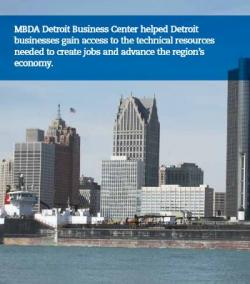 After Detroit filed bankruptcy in July 2013 as a result of the 2008 economic downturn, and 2009 collapse of the auto industry, the Obama Administration created the White House Detroit Task Force to support the city’s economic recovery. In September 2013, the Administration announced a $300 million aid package that included assistance for abandoned building demolishment, firefighters and police operating costs, transportation improvement aid, and community development block grants to stimulate investment.
After Detroit filed bankruptcy in July 2013 as a result of the 2008 economic downturn, and 2009 collapse of the auto industry, the Obama Administration created the White House Detroit Task Force to support the city’s economic recovery. In September 2013, the Administration announced a $300 million aid package that included assistance for abandoned building demolishment, firefighters and police operating costs, transportation improvement aid, and community development block grants to stimulate investment.
In partnership with U.S. Department of Commerce agencies, MBDA provided guidance and expertise to address the issues of land use, business investment, public safety, and economic development strategies. Most importantly, the Detroit MBDA Business Center reinforced its engagement with minority-firms by helping Detroit businesses gain access to the technical resources needed to create jobs and advance the region’s economy. In FY 2013, the Center helped business leaders secure over $90 million in contracts and capital, which led to the creation and retention of over 800 jobs.1 Addressing a group of Detroit area MBEs as MBDA National Deputy Director in 2013, Alejandra Y. Castillo stated, “You are the bedrocks of the community and each of you represents job creation and pathways to Detroit’s economic recovery.” As Detroit’s economic trajectory changes, MBDA is confident that minority-owned businesses will continue to play a vital role in restoring Detroit as a national economic engine.
Growing Business through Exports

The MBDA export assistance strategy is deeply rooted in inter-agency collaboration and leveraging government resources. MBDA provides minority-owned firms with technical business assistance, guidance in identifying key foreign markets, and advice on mitigating risks when doing business abroad. Our efforts are linked to the multiple resources available through our federal partners in order to promote the unique competitive advantages of U.S. businesses in global markets.
 Since President Obama launched the National Export Initiative in 2010, an ambitious plan to sell more American goods and services in foreign markets, the United States has not only seen record exports, but also an increase of 1.3 million export-related jobs.2 According to the U.S. Census, minority-owned firms are twice as likely to export; six times more likely to conduct business in a language other than English; and three times more likely to generate 100 percent of their revenues from exporting compared to non-minority owned firms, regardless of size.2 Overall, MBEs are uniquely positioned to expand their business operations through exports.
Since President Obama launched the National Export Initiative in 2010, an ambitious plan to sell more American goods and services in foreign markets, the United States has not only seen record exports, but also an increase of 1.3 million export-related jobs.2 According to the U.S. Census, minority-owned firms are twice as likely to export; six times more likely to conduct business in a language other than English; and three times more likely to generate 100 percent of their revenues from exporting compared to non-minority owned firms, regardless of size.2 Overall, MBEs are uniquely positioned to expand their business operations through exports.
Through our public and private strategic partnerships and our nationwide network of MBDA Business Centers, MBDA is well positioned to help minority-owned businesses broaden their businesses, expand their operations, seize opportunities abroad, and create jobs at home.
MBDA Clients Join Acting Secretary of Commerce on Trade Mission to Brazil, Colombia, and Panama
In 2013, three MBDA clients were selected as members of a Department of Commerce (DOC) trade mission to Brazil, Colombia, and Panama. While traveling to these countries with the Acting Secretary of Commerce, Dr. Rebecca Blank, these select companies were looking for trade opportunities in infrastructure.
Integra Design Group sent Co-founder and Vice President Richard Cuebas Ramirez to represent the architectural and engineering firm established in 1999. Integra Design Group is ranked the fourth largest architectural services firm in Puerto Rico, according to the Caribbean Book of Lists. The DeValle Group, a family-owned general construction company founded in 1988, was represented by Managing Partner Humberto Reynolds, who was born and raised in Panama. According to Caribbean Business, the DeValle Group was named the sixth largest construction company in 2009. CondorTech, founded by Jorge Lazano in 1989, specializes in electronic security systems and comprehensive security system design, installation, training and support. CondorTech was the third MBDA client afforded the opportunity to travel on this DOC trade mission.


Identifying Commercial Opportunities via Trade Mission to Brazil
Brazil currently represents the sixth largest economy in the world and has abundant reserves and deposits of natural resources that have fueled the country’s economic growth during the past 10 years. Brazil will host the 2014 World Cup Soccer Tournament and the Olympic Summer Games in 2016. These events represent significant opportunities for U.S. minority-owned firms.
In August 2013, the San Antonio MBDA Business Center Director Orestes Hubbard and MBDA Global Business Center Project Manager David Leister led a delegation of firms on a trade mission to Brazil. This trade mission was aimed at identifying commercial opportunities and building relationships with key in-country stakeholders within government and corporate environments to help facilitate export/investment opportunities for minority-owned firms interested in doing business in Brazil. During this trip, several major opportunities were identified for both near-term and long-range exports. With Brazilian consumers displaying a strong preference for American technology, services, and consumer goods, MBDA worked with trade mission participants to develop market entry strategies and identify target opportunities in FY 2013 and beyond. The Atlanta MBDA Business Center, in partnership with the International Trade Administration, also accompanied one of its clients to Brazil for a series of meetings to evaluate business and expansion opportunities.
Connecting MBEs to Contracting Opportunities through Power Africa
The economic growth among African countries has increased the demand for energy throughout the continent. In particular, sub-Saharan Africa is a region where over two-thirds of the population is without electricity, and more than 85 percent of those living in rural areas lack access. Power Africa is a multinational effort that includes Ethiopia, Ghana, Kenya, Liberia, Nigeria, and Tanzania with the common goal of doubling access to power in sub-Saharan Africa. Power Africa will also partner with Uganda and Mozambique on responsible oil and gas resource management. The Power Africa initiative will add more than 10,000 megawatts of cleaner, more efficient electricity generation capacity and will increase electricity access to at least 20 million new households and commercial entities.
The U.S. commitment to Power Africa includes technical business support from MBDA, the U.S. Agency for International Development, the Overseas Private Investment Corporation, the Export-Import Bank of the United States, the Millennium Challenge Corporation, the U.S. Trade and Development Agency, and the U.S. African Development Foundation, along with private investors—General Electric Corporation, Symbion Power, and the African Finance Corporation—totaling over $16 billion.12
During FY 2013, MBDA worked with several of these organizations to ensure that minority-owned firms had access to the many contracting opportunities resulting from the Power Africa initiative. The Chicago MBDA Business Center was awarded a supplemental grant by MBDA to spearhead and African Global Pathways initiative. This initiative provided MBE firms with access to expert consulting services that promote business-to-business linkage between Power Africa nations and U.S. MBEs.
Honoring Minority Business Leaders
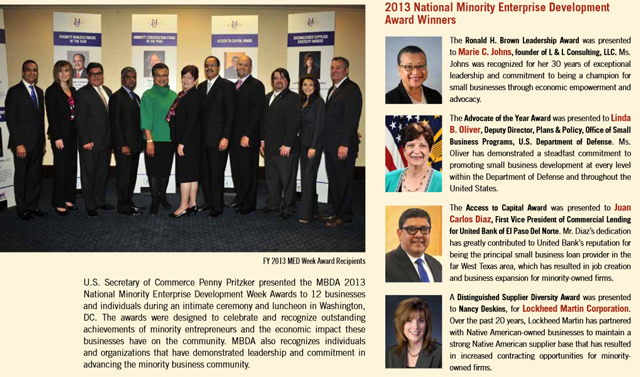


FY 2013 Performance
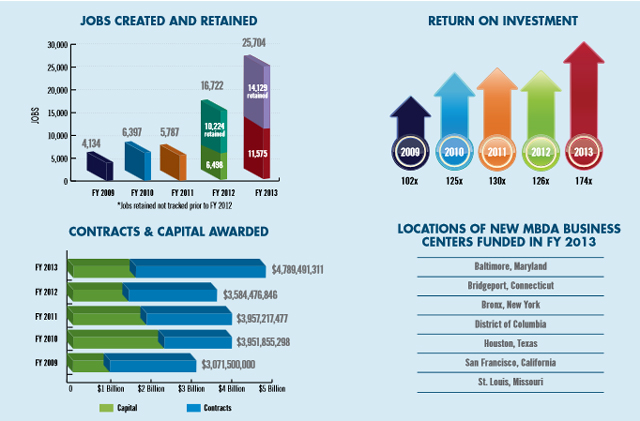
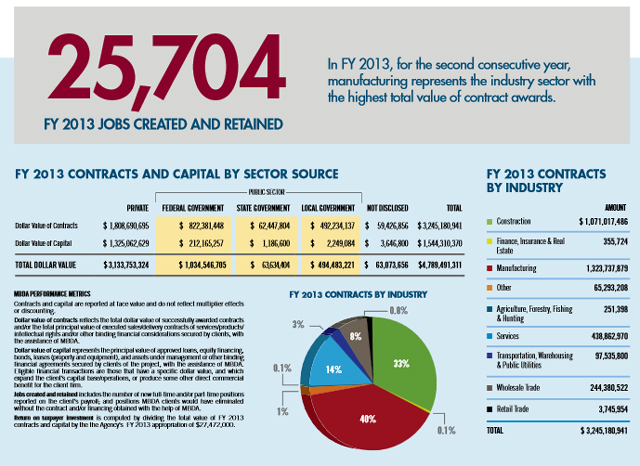
African American-Owned Firms
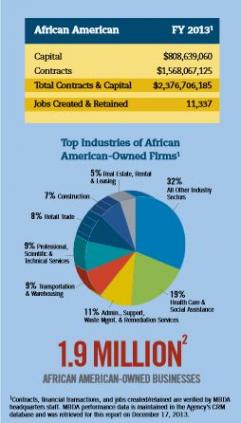 In FY 2013, MBDA helped African American-owned businesses access $2.4 billion in contracts and capital, which led to the creation and retention of 11,337 jobs.
In FY 2013, MBDA helped African American-owned businesses access $2.4 billion in contracts and capital, which led to the creation and retention of 11,337 jobs.
Quick Facts about African American-Owned Businesses2
- There are 1.9 million African American-owned firms in the United States.
- African American-owned firms contribute $136 billion in U.S. economic output and 910,000 jobs per year.
- African American-owned firms with employees average nine workers and $912,000 in annual receipts.
- Between 2002 and 2007, the number of African American-owned firms grew 60 percent.
- African American-owned firms are more concentrated in California, Florida, Georgia, Illinois, Maryland, New York, and Texas
Success Story: Weems Design Studio, Inc.
Weems Design Studio, Inc. (WDS), an established global and software engineering firm, became a client of the Atlanta MBDA Business Center in 2013. The innovative company provides technical services for businesses in the financial services, healthcare, manufacturing, and government sectors. WDS has taken advantage of the numerous professional development opportunities at the Atlanta Center, including business consultations in strategic planning, implementation services, networking, and CEO training seminars. WDS credits its success in securing transformative contracts to MBDA. It has been able to secure $5 million in contracts this year, an astounding 100 percent increase from contracts secured in 2012.
The Atlanta MBDA Center has connected WDS to the Center’s Health IT program, resulting in the development of a new mobile telehealth product at the Georgia Institute of Technology. Charles Weems III, CEO of WDS, completed the CEO training that has prepared him to manage the exponential growth of his business.
“Connecting to the Atlanta MBDA Business Center has allowed me to access resources that I never knew existed. I am developing telehealth mobile software with Georgia Tech, meeting major decision makers in healthcare, and expanding my business in ways that I never thought of.”
— Charles Weems III, CEO, Weems Design Studio, Inc.
Asian American-Owned Firms
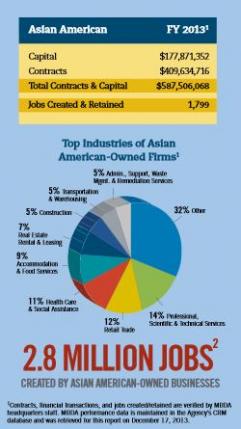 In FY 2013, MBDA helped Asian American-owned businesses access $588 million in contracts and capital, which led to the creation and retention of 1,799 jobs.
In FY 2013, MBDA helped Asian American-owned businesses access $588 million in contracts and capital, which led to the creation and retention of 1,799 jobs.
Quick Facts about Asian American-Owned Businesses2
- There are 1.5 million Asian American-owned firms in the United States.
- Asian American-owned firms contribute $506 billion in U.S. economic output and 2.8 million jobs per year.
- Asian American-owned firms with employees average seven workers and $1.1 million in annual receipts.
- Between 2002 and 2007, the number of Asian American-owned firms grew 40 percent or faster in 26 states.
- Asian American-owned firms are more concentrated in California, Florida, Hawaii, Illinois, New Jersey, New York, and Texas.
Success Story: Amland Corporation
Founded in 2002 by Kevin Phan, Amland Corporation, is an electrical and civil engineering firm based in San Jose, California. An émigré from Vietnam, Mr. Phan came to the United States in 1982 and went to work for CalTrans, the state agency in California responsible for highway, bridge and rail transportation, planning, construction and maintenance. It was at CalTrans that Mr. Phan developed his interests in electrical contracting and civil transportation engineering.
The San Jose MBDA Business Center helped Amland to obtain bonding, working capital, and insurance, and to improve its marketing strategy, which led to a contract with the city of Oakland for a major lighting project. This project will illuminate 800 miles of city streets—the equivalent of 450 square miles—and is the largest LED conversation plan undertaken by any American city to date. Because of this contract, Amland was able to create two new jobs and nine existing employees. Other notable Amland clients include the cities of San Jose and San Leandro, the Santa Clara Valley Transportation Authority and CalTrans.
“Our working relationship with the San Jose MBDA Business Center lent credibility and confidence to Amland Corp. as a civil engineering firm.
— Kevin Phan, President, Amland Corporation
Hispanic American-Owned Firms
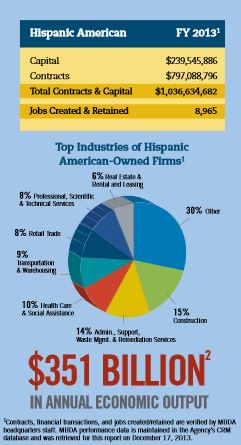 In FY 2013, MBDA helped Hispanic American-owned businesses access $1 billion in contracts and capital, which led to the creation and retention of 8,965 jobs.
In FY 2013, MBDA helped Hispanic American-owned businesses access $1 billion in contracts and capital, which led to the creation and retention of 8,965 jobs.
Quick Facts about Hispanic American-Owned Businesses2
- There are 2.3 million Hispanic American-owned firms in the United States.
- Hispanic American-owned firms contribute $351 billion in U.S. economic output and 1.9 million jobs per year.
- Hispanic American-owned firms with employees average eight workers and $1.1 million in annual receipts.
- Between 2002 and 2007, Hispanic American-owned firms grew faster than the national average (44 percent) in 27 states and Washington, DC.
- Hispanic American-owned firms are more concentrated in Arizona, California, Florida, Illinois, New Jersey, New York, and Texas.
Success Story: InterChez
Hailing from humble beginnings in Cleveland, Ohio, Sharlene Ramos-Chesnes now leads a large and fast-growing international supply chain business. InterChez, a company she runs with her husband Mark, is comprised of several specialized operating units: InterChez Logistics Systems, InterChez Global Services, and InterChez Technologies. Entering its 13th year in business, InterChez employs over 40 full-time employees in Ohio and Michigan.
The InterChez team consulted with the Cleveland MBDA Business Center on strategies to grow the company by 50 percent. It was determined that financial assistance was needed to achieve that growth, so the Center assisted by identifying potential investors from its pool of financial partners. As a result, InterChez connected with KeyBank and secured a $1 million line of credit.
The Cleveland MBDA Business Center continued to support Ramos-Chesnes and her business after the initial deal was done. When Ramos-Chesnes expressed interest in Dartmouth College’s Amos Tuck School of Business Minority Executive Program and the great value it would bring to InterChez and her community, the MBDA Business Center offered to sponsor her attendance. Sharlene Ramos-Chesnes graduated from the program in 2013.
Native American-Owned Firms
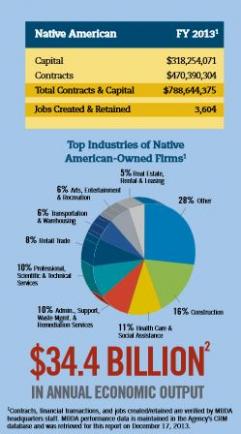 In FY 2013, MBDA helped Native American-owned businesses access $789 million in contracts and capital, which led to the creation and retention of 3,604 jobs.
In FY 2013, MBDA helped Native American-owned businesses access $789 million in contracts and capital, which led to the creation and retention of 3,604 jobs.
Quick Facts about Native American-Owned Businesses2
- There are 237,000 Native American-owned firms in the United States.
- Native American-owned firms contribute $34.4 billion in U.S. economic output and 185,000 jobs per year.
- Native American-owned firms with employees average eight workers and $1.2 million in annual receipts.
- Native American-owned firms are more concentrated in Arizona, California, Florida, New Mexico, New York, Oklahoma, and Texas.
Success Story: Terra Firma II, Inc.
Founded in 2002 by Michael Giomi, Terra Firma II, Inc. is a Native American-owned construction management company. In 2007, Terra Firma II was significantly impacted by the economic downturn and faced difficulties procuring any type of funding for new development based on its past debt with an institutional lender. Prior to working with the Seattle MBDA Business Center, Terra Firma II’s growth was extremely limited.
As soon as Terra Firma II, Inc. became an MBDA client, the Seattle staff provided the company a detailed, four-step growth plan. The plan was set in action in June 2012. One year later, Terra Firma II, Inc. secured a $400,000 loan with Cobalt Mortgage, thereby securing its assets and equity. The fourth step, which is still in process, is to assist the client in securing a new business line of credit so that it can have working capital for private, public, and Native American developments, hence creating more jobs.
“The bottom line is that without the guidance of the MBDA, I would not have been able to negotiate down my institutional debt and obtain refinancing for our investment property.”
— Michael Giomi, CEO of Terra Firma II, Inc.
Jobs Created and Retained by Congressional District
| State | MBDA Business Center |
Operator/Grant Recipient |
Jobs
Created and retained |
Congressional District
|
| Alabama | Mobile | Mobile Area Chamber of Commerce |
653
|
AL-01
|
| Alaska | Anchorage | Native American Contractors Association |
45
|
At-Large
|
| Arizona | Phoenix | Gonzalo A. de la Melena, Jr. |
1,999
|
AZ-09
|
| California | Fresno | Asian, Inc. |
1,653
|
CA-22
|
| California | Los Angeles | University of Southern California |
618
|
CA-37
|
| California | Riverside | Southern California Corporate Growth Partners |
275
|
CA-41
|
| California | San Francisco* | Asian, Inc. |
N/A
|
CA-12
|
| California | San Jose | Asian, Inc. |
479
|
CA-17
|
| Colorado | Denver | Rocky Mountain Minority Supplier Development Council |
2,179
|
CO-01
|
| Connecticut | Bridgeport* | Greater New England Minority Supplier Development Council |
N/A
|
CT-04
|
| District of Columbia | Capitol* | Performance-Based Solutions, Inc. |
N/A
|
At-Large
|
| District of Columbia | Federal Procurement Center | Metropolitan Economic Development Association |
266
|
At-Large
|
| District of Columbia | Washington DC | National Community Reinvestment Coalition |
196
|
At-Large
|
| Florida | Miami | M. Gill & Associates Incorporated |
908
|
FL-27
|
| Florida | Orlando | Florida Minority Supplier Development Council |
210
|
FL-05
|
| Georgia | Atlanta | Georgia Tech Research Corporation |
1,201
|
GA-04
|
| Hawaii | Honolulu | University of Hawaii |
315
|
HI-01
|
| Illinois | Chicago | Chicago Minority Business Development Council |
5,471
|
IL-07
|
| Indiana | Indianapolis | Indiana Minority Supplier Development Council |
381
|
IN-07
|
| Louisiana | New Orleans | Louisiana Minority Business Council |
1,363
|
LA-02
|
| Maryland | Baltimore* | City of Baltimore |
N/A
|
MD-07
|
| Massachusetts | Boston | Greater New England Minority Supplier Development Council |
319
|
MA-07
|
| Michigan | Detroit | Michigan Minority Supplier Development Council |
812
|
MI-13
|
| Minnesota | Minneapolis | Metropolitan Economic Development Association |
745
|
MN-05
|
| Missouri | St. Louis* | Chicago Minority Business Development Council |
142
|
MS-01
|
| Nevada | Las Vegas | New Ventures Capital Development Company |
217
|
NV-01
|
| New Mexico | Albuquerque | NEDA Business Consultants Incorporated |
332
|
NM-01
|
| New Mexico | Santa Fe | American Indian Chamber of Commerce of New Mexico |
42
|
NM-03
|
| New York | Manhattan | National Community Reinvestment Coalition |
195
|
NY-10
|
| New York | South Bronx* | South Bronx Overall Economic Development Corporation |
N/A
|
NY-15
|
| New York | Williamsburg | ODA Community Development Corporation |
N/A
|
NY-07
|
| North Carolina | Raleigh | North Carolina Institute of Minority Economic Development |
364
|
NC-04
|
| North Dakota | Bismarck | United Tribes Technical College |
109
|
At-Large
|
| Ohio | Cleveland | The Commission on Economic Inclusion |
245
|
OH-11
|
| Oklahoma | Tulsa | Rural Enterprises of Oklahoma Incorporated |
47
|
OK-01
|
| Pennsylvania | Philadelphia | The Enterprise Center |
135
|
PA-02
|
| Puerto Rico | San Juan | Asocicion Productos de Puerto Rico Incorporated |
475
|
At-Large
|
| South Carolina | Columbia | DESA, Incorporated |
304
|
SC-06
|
| Tennessee | Memphis | Mid-South Minority Business Council Continuum Incorporated |
932
|
TN-09
|
| Texas | Dallas | Dallas Fort Worth Minority Supplier Development Council |
422
|
TX-33
|
| Texas | El Paso | El Paso Hispanic Chamber of Commerce |
434
|
TX-16
|
| Texas | Houston* | Houston Community College |
N/A
|
TX-20
|
| Texas | San Antonio | University of Texas, San Antonio |
796
|
TX-07
|
| Washington | Seattle | Seattle Business Assistance Center |
425
|
WA-09
|
*New MBDA Business Center
MBDA Business Services
Access to Markets
- Strategic alliances
- Solicitation analysis and bid/proposal preparation
- Negotiation and closing
- Conducting Business-to-Business (B2B) forums
- Procurement matchmaking events
- Contract negotiations and closings
Global and Export Assistance
- Identification of export markets
- Facilitating global transactions
- Referrals to international trade programs and services
- International market analysis
- Market promotion assistance
- International trade assistance
Access to Capital
Minority-owned firms are less likely to obtain loans than non-minority owned firms and typically receive financing in lower amounts and at less favorable terms. After a thorough client assessment focused on business profitability, stability, and solvency, MBDA business development specialists and MBDA Business Center experts work with the client to determine the appropriate capital structure and tactical approach to obtain the capital needed. Services include:
- Identifying financing opportunities and sourcing deals
- Financing forums and networking events
- Strategic alliances with banks and financial institutions
- Brokerage of financial transactions
- Identification and closure of mergers and acquisitions
Access to Contracts
MBDA staff and MBDA Business Centers collaborate to provide procurement assistance to help minority-owned firms do business with the federal, state, and local governments, as well as private corporations. Contract services include:
- Identification of procurement opportunities
- Post-award contract administration
- Solicitation analysis
- Central contractor registration
- Bid and proposal preparation
- Certification assistance
- Research contract award histories
- Teaming arrangements
Strategic Business Consulting
MBDA staff and MBDA Business Center professionals provide tailored business consulting services directed towards assisting clients in achieving higher levels of growth and competitiveness. Strategic business consulting services include:
- Market research, promotion, and advertising
- Sales consulting and forecasting
- Market feasibility studies
- Pricing, customer service, and brochure design
- Financial management
- Tax planning
- Business consulting
- Operations and quality management
- Construction — estimating, bid preparation, and bonding
- Manufacturing — facility leasing
- Mergers and acquisitions
MBDA Senior Management Team

Nationwide Network of MBDA Centers
MBDA administers and manages a competitive cooperative grant program to operate its nationwide network of MBDA Business Centers. Our partners are state and local governments, tribal entities, and universities, including minority-serving institutions and for-profit entities. The MBDA supports Centers with a national team of business development specialists.
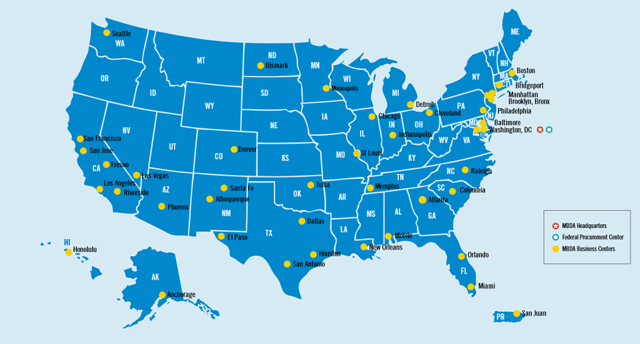
MBDA Performance Metrics
Definitions
Number of Jobs Created The number of new full time and/or part time positions reported on the client’s payroll during the funding year. Persons on paid sick leave, paid holiday and paid vacations are included as employees, as are salaried officers and executives of corporations. However, proprietors and partners of unincorporated businesses are not considered employees under this definition.
Number of Jobs Retained The number of existing full time and/or part time employee positions retained and reported on the client’s payroll during the funding year. Job retention pertains to maintaining the status quo of persons employed by the client in lieu of subjective and objective decisions made by the client to reduce its work force due to economic conditions, lack of capital, failure to secure necessary contracts and/or sales. Persons on paid sick leave, paid holiday and paid vacations are included as employees, as are salaried officers and executives of corporations. However, proprietors and partners of unincorporated businesses are not considered employees under this definition.
Dollar Value of Awarded Contracts and Procurements This represents the total dollar value of successfully awarded contracts and/or the total principal value of executed sales/delivery contracts of services/products/intellectual rights and/or other binding financial considerations secured by clients of the MBDA Business Centers, with the assistance of Center staff. For purposes of this performance element, Dollar Value of Awarded Contracts and Procurements are those transactions which have a specific dollar value, and which produce a commercial benefit for the client firm.
Number of Contracts The number of awarded contracts and other binding procurement awards secured by client firms.
Dollar Value of Awarded Financial Transactions The total principal value of approved loans, equity financings, bonds, leases (property and equipment), assets under management or other binding financial agreements secured by clients of the MBDA Business Centers with the assistance of Center staff.
Number of Financial Transactions The number of successful financial transactions secured by client firms.
Return on Taxpayer Investment The total value of contracts and capital obtained by clients as a result of their work with MBDA divided by the Agency’s fiscal year budget appropriation.
Number of Clients Served The actual number of clients served in a funding period. Clients are defined as those that have registered with the MBDA Business Center and completed a written engagement for specific services. Clients may be counted only once during the program year. Clients from a prior program year may be counted in a subsequent program year if continued service provision to said clients is documented.
Number of Export Transactions Facilitated The number of global contract opportunities and export financing transactions secured by client firms as a result of direct assistance from an MBDA Business Center.
Number of Strategic Transactions Facilitated The number of awarded transactions secured by clients that included successful MBDA Business Center facilitation of joint ventures, teaming arrangements, and/or the number of mergers and acquisitions brokered on behalf of clients by the Center.
Number of Referrals The number of referrals made by the Center to clients seeking assistance that is outside the scope of MBDA Business Center program services. Referrals may be made to strategic partners or other external service providers able to provide services that are relevant to the client.
Management Assessment MBDA’s overall evaluation of the MBDA Business Center, based on the Agency’s internal review of the Center’s operations. The management assessment focuses on such areas as the development of written service engagements and work plans; proper staffing; adherence to scheduled work hours; recordkeeping; successful completion of Agency training; customer relationship management, maintenance of strategic partnerships; market promotion and any other areas MBDA may deem to be relevant in determining the overall quality of the Center’s operations. An operator may also lose up to two points from the assessment if the MBDA Business Center staff fails to participate in the required training credit hours.
Promotion of MBDA The extent to which MBDA Business Centers meet and exceed the requirements for communication of the mission and objectives of MBDA within the business and government community.
1 Contracts, financial transactions, and jobs created/retained are verified by MBDA headquarters staff. MBDA performance data is maintained in the Agency’s CRM database and was retrieved for this report on December 17, 2013.
2 United States Department of Commerce, Census Bureau, 2007 Survey of Business Owners, June 2010
3 U.S. Department of Commerce, Census Bureau, 2007 Survey of Business Owners, retrieved from http://factfinder2.census.gov, April 9, 2014
4 National Association of Small Business International Trade Educators
5 Website traffic is measured using Google Analytics; social media followers are taken directly from Facebook.com, Twitter.com, and LinkedIn; and MBDA newsletter subscribers are measured using the http://www.mbda.gov content management tool, Drupal.
6 Interview with David DeLeon, business development specialist, Phoenix MBDA Business Center.” Personal interview. 31 Mar. 2014.
7 Interview with Clarence and Reyna McAllister, owners, Fortis Networks.” Personal interview. 31 Mar. 2014.
8 Interview with Paul Iacovacci, managing director, Brevet Capiatal Management.” Personal interview. February 7, 2014.
9 Interview with Joann Hill, chief, MBDA Office of Business Development.” Personal interview. April 15, 2014
10 United States Department of Labor, Employment and Training Administration. High Growth Industry
profile for Healthcare. Retrieved on December 3, 2013 from the Department of Labor website: http://www.doleta.gov/brg/indprof/healtcare_profile.cfm
11 United States Department of Commerce, National Oceanic and Atmospheric Administration, Retrieved from http://www.gulfspillrestoration.noaa.gov/oil-spill/ on May 7, 2014
12 Fact sheet: Power Africa, retrieved from http://www.whitehouse.gov/the-press-office/20013/06/30/fact-sheet-power-africa/on May 7,2014
13 Interview with Saundra Thurman-Custis, owner, Crystal Enterprises.” Personal interview. April 4, 2014.
Performance’






